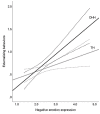Emotions in Deaf and Hard-of-Hearing and Typically Hearing Children
- PMID: 34323978
- PMCID: PMC8448426
- DOI: 10.1093/deafed/enab022
Emotions in Deaf and Hard-of-Hearing and Typically Hearing Children
Abstract
For deaf and hard-of-hearing (DHH) children living in an environment where their access to linguistic input and social interactions is compromised, learning emotions could be difficult, which may further affect social functioning. To understand the role of emotion in DHH children's social life, this study investigated emotional functioning (i.e., emotion recognition, empathy, emotion expression), and its relation with social functioning (i.e., social competence and externalizing behaviors), in 55 DHH children and 74 children with typical hearing (aged 3-10 years; Mage = 6.04). Parental reports on children's emotional and social functioning and factors related to DHH children's hearing were collected. Results showed similar levels of emotional and social functioning in children with and without hearing loss. Use of auditory intervention and speech perception did not correlate with any measures in DHH children. In both groups, higher levels of empathy related to higher social competence and fewer externalizing behaviors; emotion recognition and positive emotion expression were unrelated to either aspect of social functioning. Higher levels of negative emotion expression related to lower social competence in both groups, but to more externalizing behaviors in DHH children only. DHH children in less linguistically accessible environments may not have adequate knowledge for appropriately expressing negative emotions socially.
© The Author(s) 2021. Published by Oxford University Press.
Figures


References
-
- Antia, S. D., Jones, P., Luckner, J., Kreimeyer, K. H., & Reed, S. (2011). Social outcomes of students who are deaf and hard of hearing in general education classrooms. Exceptional Children, 77(4), 489–504. doi: 10.1177/001440291107700407 - DOI
-
- Bat-Chava, Y., Martin, D., & Kosciw, J. G. (2005). Longitudinal improvements in communication and socialization of deaf children with cochlear implants and hearing aids: Evidence from parental reports. Journal of Child Psychology and Psychiatry, 46, 1287–1296. doi: 10.1111/j.1469-7610.2005.01426.x - DOI - PubMed
Publication types
MeSH terms
LinkOut - more resources
Full Text Sources
Medical

